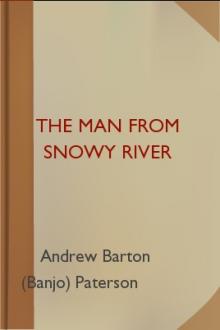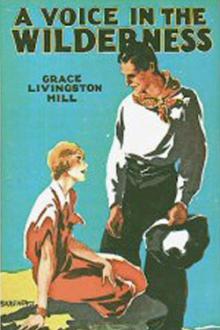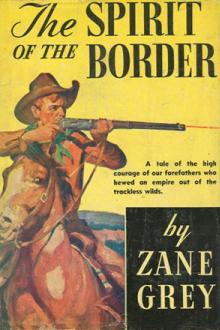The Last Trail, Zane Grey [universal ebook reader txt] 📗

- Author: Zane Grey
Book online «The Last Trail, Zane Grey [universal ebook reader txt] 📗». Author Zane Grey
"Well?" Colonel Zane said impatiently, when Jonathan hesitated in his story.
"One got away," he said reluctantly. "I barked him as he was runnin' like a streak through the bushes, an' judged that he was hard hit. I got the hosses, an' turned back on the trail of the white man."
"Where did it end?"
"In that hard-packed path near the blacksmith shop. An' the fellar steps as light as an Injun."
"He's here, then, sure as you're born. We've lost no horses yet, but last week old Sam heard a noise in the barn, and on going there found Betty's mare out of her stall."
"Some one as knows the lay of the land had been after her," suggested
Jonathan.
"You can bet on that. We've got to find him before we lose all the fine horse-flesh we own. Where do these stolen animals go? Indians would steal any kind; but this thief takes only the best."
"I'm to meet Wetzel on the ridge soon, an' then we'll know, for he's goin' to find out where the hosses are taken."
"That'll help some. On the way back you found where the white girl had been taken from. Murdered father, burned cabin, the usual deviltry."
"Exactly."
"Poor Mabel! Do you think this white thief had anything to do with carrying her away?"
"No. Wetzel says that's Bing Legget's work. The Shawnees were members of his gang."
"Well, Jack, what'll I do?"
"Keep quiet an' wait," was the borderman's answer.
Colonel Zane, old pioneer and frontiersman though he was, shuddered as he went to his room. His brother's dark look, and his deadly calmness, were significant.
CHAPTER IVTo those few who saw Jonathan Zane in the village, it seemed as if he was in his usual quiet and dreamy state. The people were accustomed to his silence, and long since learned that what little time he spent in the settlement was not given to sociability. In the morning he sometimes lay with Colonel Zane's dog, Chief, by the side of a spring under an elm tree, and in the afternoon strolled aimlessly along the river bluff, or on the hillside. At night he sat on his brother's porch smoking a long Indian pipe. Since that day, now a week past, when he had returned with the stolen horses, his movements and habits were precisely what would have been expected of an unsuspicious borderman.
In reality, however, Jonathan was not what he seemed. He knew all that was going on in the settlement. Hardly a bird could have entered the clearing unobserved.
At night, after all the villagers were in bed, he stole cautiously about the stockade, silencing with familiar word the bristling watch-hounds, and went from barn to barn, ending his stealthy tramp at the corral where Colonel Zane kept his thoroughbreds.
But all this scouting by night availed nothing. No unusual event occurred, not even the barking of a dog, a suspicious rustling among the thickets, or whistling of a night-hawk had been heard.
Vainly the borderman strained ears to catch some low night-signal given by waiting Indians to the white traitor within the settlement. By day there was even less to attract the sharp-eyed watcher. The clumsy river boats, half raft, half sawn lumber, drifted down the Ohio on their first and last voyage, discharged their cargoes of grain, liquor, or merchandise, and were broken up. Their crews came back on the long overland journey to Fort Pitt, there to man another craft. The garrison at the fort performed their customary duties; the pioneers tilled the fields; the blacksmith scattered sparks, the wheelwright worked industriously at his bench, and the housewives attended to their many cares. No strangers arrived at Fort Henry. The quiet life of the village was uninterrupted.
Near sunset of a long day Jonathan strolled down the sandy, well-trodden path toward Metzar's inn. He did not drink, and consequently seldom visited the rude, dark, ill-smelling bar-room. When occasion demanded his presence there, he was evidently not welcome. The original owner, a sturdy soldier and pioneer, came to Fort Henry when Colonel Zane founded the settlement, and had been killed during Girty's last attack. His successor, another Metzar, was, according to Jonathan's belief, as bad as the whiskey he dispensed. More than one murder had been committed at the inn; countless fatal knife and tomahawk fights had stained red the hard clay floor; and more than one desperate character had been harbored there. Once Colonel Zane sent Wetzel there to invite a thief and outlaw to quit the settlement, with the not unexpected result that it became necessary the robber be carried out.
Jonathan thought of the bad name the place bore all over the frontier, and wondered if Metzar could tell anything about the horse-thieves. When the borderman bent his tall frame to enter the low-studded door he fancied he saw a dark figure disappear into a room just behind the bar. A roughly-clad, heavily-bearded man turned hastily at the same moment.
"Hullo," he said gruffly.
"H' are you, Metzar. I just dropped in to see if I could make a trade for your sorrel mare," replied Jonathan. Being well aware that the innkeeper would not part with his horse, the borderman had made this announcement as his reason for entering the bar-room.
"Nope, I'll allow you can't," replied Metzar.
As he turned to go, Jonathan's eyes roamed around the bar-room.
Several strangers of shiftless aspect bleared at him.
"They wouldn't steal a pumpkin," muttered Jonathan to himself as he left the inn. Then he added suspiciously, "Metzar was talkin' to some one, an' 'peared uneasy. I never liked Metzar. He'll bear watchin'."
The borderman passed on down the path thinking of what he had heard against Metzar. The colonel had said that the man was prosperous for an innkeeper who took pelts, grain or meat in exchange for rum. The village gossips disliked him because he was unmarried, taciturn, and did not care for their company. Jonathan reflected also on the fact that Indians were frequently coming to the inn, and this made him distrustful of the proprietor. It was true that Colonel Zane had red-skinned visitors, but there was always good reason for their coming. Jonathan had seen, during the Revolution, more than one trusted man proven to be a traitor, and the conviction settled upon him that some quiet scouting would show up the innkeeper as aiding the horse-thieves if not actually in league with them.
"Good evening, Jonathan Zane."
This greeting in a woman's clear voice brought Jonathan out from his reveries. He glanced up to see Helen Sheppard standing in the doorway of her father's cabin.
"Evenin', miss," he said with a bow, and would have passed on.
"Wait," she cried, and stepped out of the door.
He waited by the gate with a manner which showed that such a summons was novel to him.
Helen, piqued at his curt greeting, had asked him to wait without any idea of what she would say. Coming slowly down the path she felt again a subtle awe of this borderman. Regretting her impulsiveness, she lost confidence.
Gaining the gate she looked up intending to speak; but was unable to do so as she saw how cold and grave was his face, and how piercing were his eyes. She flushed slightly, and then, conscious of an embarrassment new and strange to her, blushed rosy red, making, as it seemed to her, a stupid remark about the sunset. When he took her words literally, and said the sunset was fine, she felt guilty of deceitfulness. Whatever Helen's faults, and they were many, she was honest, and because of not having looked at the sunset, but only wanting him to see her as did other men, the innocent ruse suddenly appeared mean and trifling.
Then, with a woman's quick intuition, she understood that coquetries were lost on this borderman, and, with a smile, got the better of her embarrassment and humiliation by telling the truth.
"I wanted to ask a favor of you, and I'm a little afraid."
She spoke with girlish shyness, which increased as he stared at her.
"Why—why do you look at me so?"
"There's a lake over yonder which the Shawnees say is haunted by a woman they killed," he replied quietly. "You'd do for her spirit, so white an' beautiful in the silver moonlight."
"So my white dress makes me look ghostly," she answered lightly, though deeply conscious of surprise and pleasure at such an unexpected reply from him. This borderman might be full of surprises. "Such a time as I had bringing my dresses out here! I don't know when I can wear them. This is the simplest one."
"An' it's mighty new an' bewilderin' for the border," he replied with a smile in his eyes.
"When these are gone I'll get no more except linsey ones," she said brightly, yet her eyes shone with a wistful uncertainty of the future.
"Will you be happy here?"
"I am happy. I have always wanted to be of some use in the world. I assure you, Master Zane, I am not the butterfly I seem. I have worked hard all day, that is, until your sister Betty came over. All the girls have helped me fix up the cabin until it's more comfortable than I ever dreamed one could be on the frontier. Father is well content here, and that makes me happy. I haven't had time for forebodings. The young men of Fort Henry have been—well, attentive; in fact, they've been here all the time."
She laughed a little at this last remark, and looked demurely at him.
"It's a frontier custom," he said.
"Oh, indeed? Do all the young men call often and stay late?"
"They do."
"You didn't," she retorted. "You're the only one who hasn't been to see me."
"I do not wait on the girls," he replied with a grave smile.
"Oh, you don't? Do you expect them to wait on you?" she asked, feeling, now she had made this silent man talk, once more at her ease.
"I am a borderman," replied Jonathan. There was a certain dignity or sadness in his answer which reminded Helen of Colonel Zane's portrayal of a borderman's life. It struck her keenly. Here was this young giant standing erect and handsome before her, as rugged as one of the ash trees of his beloved forest. Who could tell when his strong life might be ended by an Indian's hatchet?
"For you, then, is there no such thing as friendship?" she asked.
"On the border men are serious."
This recalled his sister's conversation regarding the attentions of the young men, that they would follow her, fight for her, and give her absolutely no peace until one of them had carried her to his cabin a bride.
She could not carry on the usual conventional conversation with this borderman, but remained silent for a time. She realized more keenly than ever before how different he was from other men, and watched closely as he stood gazing out over the river. Perhaps something she had said caused him to think of the many pleasures and joys he missed. But she could not be certain what was in his mind. She was not accustomed to impassive faces and cold eyes with unlit fires in their dark depths. More likely he was thinking of matters nearer to his wild, free life; of his companion Wetzel somewhere out beyond those frowning hills. Then she remembered that the colonel had told her of his brother's love for nature in all its forms; how he watched the shades of evening fall; lost himself in contemplation of the last copper glow flushing the western sky, or became absorbed in the bright stars. Possibly he had forgotten her presence. Darkness was rapidly stealing down upon them. The evening, tranquil and gray, crept over them with all its mystery. He was a part of it. She could not hope to understand him; but saw clearly that his was no common personality. She wanted to speak, to voice a sympathy strong within her; but she did not know what to say to this borderman.
"If what your sister tells me of the border is true, I may soon need a friend," she said, after weighing well her words. She faced him modestly





Comments (0)